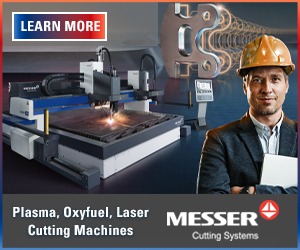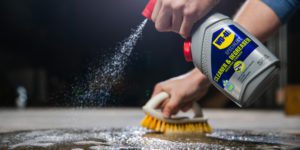How to Pick the ‘Right’ Angle Abrasive
New products have expanded the right angle grinder’s use, but they have also added some complexity to the selection process to match the right product to the right material and application while meeting the criteria most important to the end user. Dave Long of Norton Abrasives shares some helpful selection tools to simplify the process.
Posted: September 13, 2011
New products have expanded the right angle grinder’s use, but they have also added some complexity to the selection process to match the right product to the right material and application while meeting the criteria most important to the end user. Here are some helpful selection tools to simplify the process.
Over the last 20 years, right angle grinders have dramatically grown in user popularity, due to an increase in their performance and decrease in price. They are now the “go to” portable tool for metal fabrication, for everyone from the industrial production operator to the smallest contractor. With this popularity, abrasive manufacturers have added a significant number of new products to broaden the capabilities and applications that can be accomplished with right angle grinders. These include depressed center wheels, cut-off wheels, flap discs, fiber discs, non-woven discs and abrasive and wire brushes.
While new products have expanded the right angle grinder’s use, it has also added some complexity to the selection process to match the right product to the right material and application while meeting the criteria most important to the end user. The process can be simplified by using helpful selection tools.
For example, to help simplify this process, Norton has developed a guide, named Abrasive Metal Fabrication Selection Tool, to lead to the proper product selection. Below is an example that reflects how this guide works. Please reference Table 1 (at bottom and on the right) to follow.
7-STEP INSTRUCTIONS
Tool / Application / Material
Step 1 – Select the Tool: Choose the machine used in the application from the drop down menu. In this example, we have selected a “Right Angle Grinder”.
Step 2 – Select the Application: Chose the mostly closely matched description of the application from the drop down menu. In this example, we have selected “Weld Blending/Beveling”.
Step 3 – Select the Material: Select the material group/surface to be worked on from the drop down menu. In this example, we have selected “Stainless/High Alloy Steel”.
First Priority Consideration / Secondary Consideration / Intersection
Step 4 – Consider the First Priority/Selection: Choose the most important application attribute, for the customer, from the left green column.
Step 5 – Consider the Second Priority/Selection: Choose the secondary application attribute, for the customer, from the top blue row.
Step 6 – Intersection of Priorities: Find the intersecting path of both attributes to find recommended product.
Finalization of Spec
Step 7 – Finalization of Spec: Move to catalog for product selection for size and grit availability.
While this might appear a little imposing, these are actually the questions that a trained salesperson would go through in determining the correct product. The first three have already been filled in for demonstration purposes: machine, application and material. The next set of questions, on what the end user deems important attributes, determines the applicable product choice.
For the application of weld blending/beveling, the key attributes are:
- Fast Cutting: A product with a high rate of stock removal to get the job done fast
- Long Lasting: A product that lasts longer / removes more material per product changes
- Low Vibration: A product that provides less vibration to ease operator fatigue and reduce injury
- Low Pressure: A product that requires less force to operate to reduce operator fatigue and injury or that performs on a low power grinder
- Better Surface Finish/No Gouging: A product that provides a better finish and reduces gouging
- Low Total Costs: A product that provides lower labor costs associated with rate of cut
- Low Price: A product that offers a competitive initial price.
Once you answer the primary and secondary important attributes, you can easily move to the intersection within the chart of the correct product. For this blending/beveling application, depressed center wheels were the choice eight times, fiber discs were the choice fourteen times and flap discs were the most popular recommendation at twenty.
With the material being tough to grind stainless/high alloy steel, all of the recommendations were in a premium performance ceramic alumina or zirconia alumina grain. An interesting note is that almost all OEM packages include a general purpose aluminum oxide depressed center wheel with the machine at first point of sale. And, in most cases, this is a poor choice based upon what we’ve just outlined.
The final component is consulting your abrasive catalog section or calling your distributor for the final SKU number and ordering information. If you would like a copy of the full Abrasive Metal Fabrication Selection Tool for Norton Abrasives, please link to www.nortonindustrial.com.
















